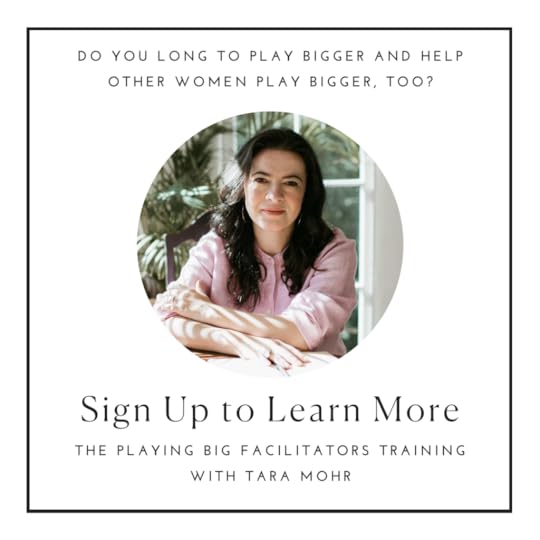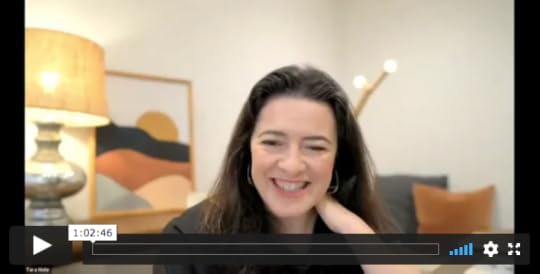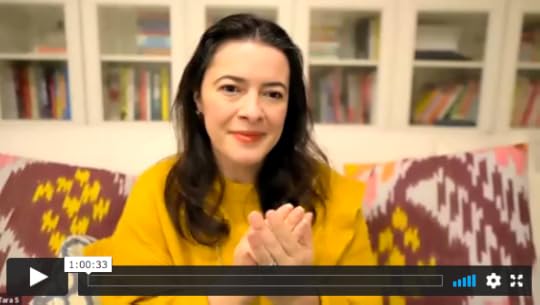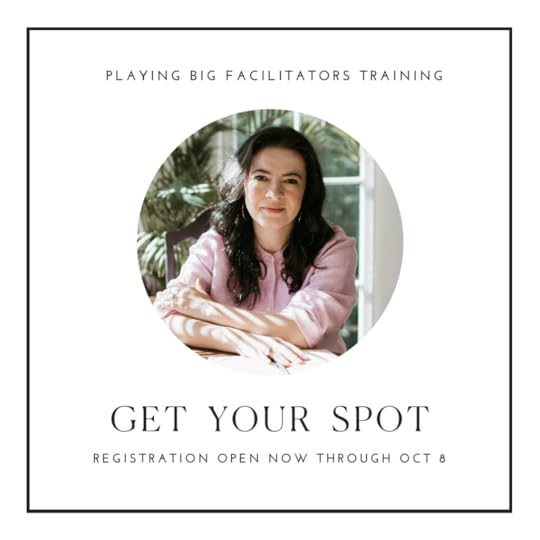Tara Mohr's Blog, page 3
March 11, 2021
How many pots of soup are cooking on your stove?
How many things have you got cooking on your stove?
In our house, at mealtime, it’s often a lot. We’ve got toddler taste buds…and kid taste buds…plus two grown ups who have each seen one too many holistic health practitioners and hold dear to our individual dietary do’s and don’ts.
In all seriousness, we love our health practitioners and our special food plans! But they do mean that there can be a lot of pots simmering on the stove at dinner time.
But today, I don’t actually want to talk about the literal pots on the stove. I want to talk about the sense you have in your life of how many things you are trying to “cook,” to make, to get right, all at once.
For many of us, it can feel like professional work is one soup we are making, family and personal relationships are a whole other pot of soup, and our own self-care is yet another pot. On top of that there may be other pots – volunteer commitments, creative side endeavors, home or financial projects, not to mention the dreams we keep meaning to get to – if only a spot on the stove would open up for them!
Of course, this is overwhelming. I’ve been thinking about the implications of feeling our lives are divided this way – like there are so many different, distinct domains and roles to attend to. It leaves us feeling daunted and depleted. Women in particular are conditioned to think of it this way, to see the compartments as distinct, and therefore to have to juggle many different ones.
But what if we hold the story differently within ourselves? What if we try on the idea that we are each only cooking up one pot of soup, one delicious creation, out of all the ingredients of our lives.
If we do that, we have a better shot at enjoying the cooking process. We get to see how the ingredients of our lives blend in interesting ways to make a rich, hearty stew. And the moments of overwhelm may feel more like opportunities to dance with the chaos playfully – a moment to throw in some spices or alter the recipe to account for the unexpected.
But how do we get there? How do we get out of the sense of juggling things on 17 different burners?
We can begin by identifying a single intention that we can carry in both our work, our personal lives, and all the other spaces through which we move.
In our Sunday session, I asked our community to do that, and they came up with so many stunning sentiments, single intentions that could credibly and supportively guide them in their work and personal lives – sentiments like these:
to spark growth in myself and others
to create connection
to be a vessel for a greater Spirit
to show up with integrity and presence
When we make one intention the touchstone, when we say it when we get up even before we get out of bed, when we say it again when we start to get stressed or distracted, the day is different. The fragmentation we see around us begins to blur into a kind of unity. We can be one self, with one intention, moving through spheres of life that may then begin to reveal themselves as not so different after all.
This – naming a unifying intention – is just one of the ways we can bring more harmony between our work lives and our personal lives. We talked about many more during the Coaching & Conversation session. If you long for more integration and harmony between the different domains of your life, I invite you to watch the full video, and do the journaling worksheet along with us here.
And last but not least – please share this with a friend or colleague whom you know would welcome a greater sense of integration and harmony between her work & personal life, too!
For today, just one big, gorgeous pot of soup, with many rich ingredients.
Just you, tending to it at the stove.
Love,
Tara
Watch the video of our Sunday Coaching & Conversation session about integration and harmony between the different domains of your life here. (It will also guide you through some journaling exercises.)
Photo credit: Trình Minh Thu
Coaching & Conversation – March 7, 2021
In this session we focus on work/personal life harmony and integration – what to do if it feels like there just isn’t enough time to do both well; what to do if it feels like you still have to be a different self at work vs. at home, and my favorite personal practices for feeling more integrated as I move through work and life. This is not an easy topic – there is a lot that is faulty (to say the least) in how this is all set up in our culture. Yet there are also many practices, mindsets and tools that can help.
Download a PDF version of the worksheet we used in the March 7th session here.
You can access the core values exercise referred to during the call here.
Join us for an upcoming Coaching and Conversation with Tara on Sunday! Sign up HERE for a full list of dates and connection details.
March 3, 2021
inner firsts
“When was the last time you did something for the first time?” -Seth Godin
I recently heard Seth Godin, author on creativity and entrepreneurship, share this question.
Seth recounted that when he asks people this question, their eyes often well up with tears. They realize just how long it’s been. They feel an ache for some former self, some former life, that was more vivid, more varied, with firsts.
It turns out a lot of people have been struck by this question – it’s been pinned and posted across the internet. Soul Pancake did an episode about it. It’s even a Van Halen lyric from about ten years ago. And there is no consensus about who asked it first.
But before you feel badly that you haven’t picked up a new instrument or tried a new cuisine recently, I want to invite you to think about this question differently.
We humans can stay busy seeking external firsts – a first visit to some new place, a first time to reach a financial milestone, a first run of a race at some speed. Sometimes these external firsts are important markers and metaphors on our journeys – they represent some deeper shift. But often, we get on a hamster-wheel pursuit of the new (and the next new, and the next new) that is not satisfying, because what we are really going after – true movement in our lives, true expansion of our experience – is not provided by external firsts.
Inner firsts are different. They are the quiet, often private, but thrilling, move-you-to-tears-joyful firsts, born from inner work:
the stretch into a new perception because we were willing to listen in a new way…
that moment of finding a new depth of courage…
telling a truth for the first time…
finding a space of compassion toward someone when we’ve long held a grudge…
receiving a bright new idea from the muse…
changing a long-held thought into a new one…
Inner firsts are ever available to us, even in mundane routine, as long as we are present and available to them.
I think we well up with tears when we hear this question about “firsts” because deep down, we know we are meant to keep experiencing firsts, to keep being astonished. Deep down, we know life is a wide field for learning and growth. And so we know something is wrong if we aren’t experiencing life that way.
But what is wrong is not that we haven’t taken up a new hobby or kissed a new person in a while. What is wrong is that we have abandoned the kind of quest that makes life full of the new.
I sometimes joke that if you need a thrill, sure, you can go skydiving or seek exotic travel or try every new cafe that opens up – or you can just dedicate yourself to changing one quality in yourself, or one thing in your world. That is the real site of adventure in our lives.
It’s because of what I journal, or what I pray, or what I dedicate myself to that I get to keep experiencing firsts – when I make time and space for those practices.
Here are some of my favorite ways to keep cultivating “firsts” – even when life is very routine.
15 Ways to Have a “First” Every Day (or Hour) of Your Life
1. Set aside everything you think you know about the person or situation in front of you. Set aside everything you think you know about your own role or position in the situation. Now see what happens differently.
2. In some important relationship, listen only to find out what is true for the other person. (This is what Dr. Rachel Naomi Remen calls “generous listening”.)
3. Be curious. Ask five curious questions in some situation in which you normally would ask none.
4. Be more courageously honest.
5. Work through your fears aloud or on paper.
6. Work through your antagonisms aloud or on paper.
7. Articulate what you are grateful for five days in a row.
8. Learn something genuinely new from someone else.
9. For a few days, act as if some new idea, belief, or concept is true (even if you aren’t sure yet) and see what happens. (Check the video below at minute 37:00 for this for more on how to do so.)
10. Enter the creative process – write, paint, dance, or create in whatever form calls to you.
11. Pray/ask for help from a force larger than you about something you feel stuck around. Then listen quietly for what is whispered back.
12. Ask for new kinds of help, or ask for help in a new way.
13. Follow your inner mentor’s guidance.
14. Get accountability or community where you have been acting solo.
15. Ask more earnestly or passionately to be of service.
Love,
Tara
Want more on this topic? Watch the video of our Sunday Coaching & Conversation session about it here. (It will also guide you through the journaling exercises.)
Photo credit: Vignesh Jayaprakash
February 28, 2021
Coaching & Conversation – February 28, 2021
“When was the last time you did something for the first time?” -Seth Godin
We humans can stay busy pursuing “external firsts” – a first visit to some country, a first time to reach a particular financial milestone. But “internal firsts” are at least as important: the stretch into a new perception, that moment of finding a new depth of courage, of telling a truth for the first time, or receiving a new idea from the muse. In this session we look at how to have meaningful “firsts” every single day of our lives, through our spiritual and personal growth work.
Download a PDF version of the worksheet we used in the February 28th session here.
Download a PDF version of the worksheet we used in the February 28th session here.
Join us for an upcoming Coaching and Conversation with Tara on Sunday! Sign up HERE for a full list of dates and connection details.
February 27, 2021
Coaching & Conversation – February 21, 2021
In this session, we talked about what to do with feelings of antagonism, resentment or animosity. Grab your pen and the worksheet HERE if you want to try out the journaling process I love for working through those difficult feelings.
Download a PDF version of the worksheet we used in the February 21st session here.
Join us for an upcoming Coaching and Conversation with Tara on Sunday! Sign up HERE for a full list of dates and connection details.
December 31, 2020
New Year’s Poem
[image error]
I wrote this New Year’s Poem a couple of years ago, and this year more than ever I know we need to “resolve something for all of us.”
I look forward to walking with you, talking with you, sharing ideas and discoveries together in this new year.
May the year ahead bring us all closer to each other.
Love,
Tara
New Year’s Poem
New year. It will not be
what you plan or what you chart.
Remember, dear? It never is.
The lines will not run straight
or the surfaces be smooth.
After all, the curriculum
is given, not chosen.
New year.
Today, do not resolve
anything for yourself.
Resolve something for all of us.
The very heart of time
is begging us to never
wish for I again,
to ask only for us.
– Tara Mohr
photo credit: Kira auf der Heide
December 7, 2020
10 Convictions About Writing
Here are ten convictions about writing I’ve come to, over the past decade of writing down thoughts, whispers, wonderings.
1. What defines us as writers is simply that we write – frequently or rarely. We are writers in that we endeavor to put our experiences, questions, sentiments, into words on the page.
2. Creativity exists naturally in all of us – but in most of us, it gets blocked. We often need support unblocking and unlocking our words.
3. Creative recovery is a thing. I’ve been through my own, and am always reaching for more of that recovery. Creative recovery can happen for us – boldly and ferociously.
4. Writing heals. As we translate our lived experience into words, we make meaning out of it. We become the authors of our experience, the creators of it in some sense, in its second life on the page.
5. For women, every act of articulation is an act of empowerment, because we are in the midst of an exodus from generations of being silenced.
6. The writing work that lands most strongly in the world is born of authenticity and courage – not from polishing, perfecting, or trying to guess what readers want.
7. To unleash the flow of words, we have to write for ourselves and ourselves alone. Impact on the world or accolades may come, but only if we’ve learned to write for ourselves first.
8. Editing and craft are merely good assistants to the more important qualities of authenticity and courage.
9. If writing feels stilted, clunky, frustrating, futile, that’s okay. We just need to dip beneath the surface in you to the place where the words are ever flowing. The flow is always tappable, and community, prompts, and structure – both in how and what we write – can help us tap the spring.
10. Most importantly: your story and life experience, your ideas and inquiries are enough to make for plenty to say. That’s so hard to see in ourselves sometimes, but I can promise you, it’s true.
Coming up in a few weeks I’ll be hosting my first ever Year-End Writing Retreat. I hope you’ll join us for a nourishing, healing, inspiring gathering online, a balm for this year.
Learn more and get your spot here.
Love,
Tara
September 30, 2020
Order in These Times
To listen to an audio companion to this post, click the player below or you can download an mp3 file here.
Tara Mohr · Order in These Times
Like most of us, this year, I’ve had many moments when I’ve heard people say, “the world is upside down,” or “this is a time of everything going wrong.” “The order of things has been completely disrupted.”
A few months ago, after I once again read one of those kinds of sentiments, I heard a little whisper in my head that, at first, shocked me. I had been cleaning up the house, picking up after the kids, and I was midway up the stairs in my home, thinking about this idea of “the world upside down.” And then, I heard something answer back to me, “Perfect order.”
As if to say, “things are in perfect order.”
This was not said in a carefree voice; the tone was grave. It was delivered like an admonishment, not an encouragement.
“No, that’s too easy – to call this chaos,” it seemed to whisper. “The truth is, nothing about this time is chaotic. The link between cause and effect is clear.”
I understood this to mean:
If we act with greed and disregard for the earth, our beautiful skies and clean air will no longer be there for us.
If our economy doesn’t put people first – treating its workers with decency and care – we will find it is profoundly vulnerable in a time of crisis.
If as a collective, we can’t walk humbly and work together diligently in the face of a pandemic, we will become its fools.
And if we try to ignore, or somehow transcend, our oppression of people and communities, without real reckoning, without the destruction of old ideas and systems and the creation of new ones, we will find out that no, there is no true way forward without deep transformation and reparation.
In all these ways, nothing that is happening now is out of order.
Nothing that is happening now is out of order – and the order it is revealing to us is one where regard for the earth, and each other, is imperative.
Because consider this:
If we could act with greed and disregard for the earth, as we have been, and pay no penalty,
If we could live divided and arrogant in the face of a pandemic, as we have been, and suffer no major loss of life,
If we could deny and perpetuate oppression of others, as we have been, and find that it does not cause suffering in our communities, our hearts, our countries…
then we would know we lived in a morally corrupt realm, or perhaps a morally agnostic one, where disconnection and dehumanization work out just fine. But what we are seeing in this time is that way of being does not work here, nor is it workable.
This is the gorgeous, unforgiving feedback loop. Gorgeously unforgiving because it will not let us out of here until we all learn the truth: none of us will find enduring peace or safety until each of us has enduring peace and safety.
That is the true order of things here.
These times are so painful, and so ugly, but the order they are pointing us to is the opposite of that – it is a beautiful and kind one. It is the one many of us have been fighting for, or longing for, or suspecting was the way of things, for a very long time.
When we look at the news, or to our streets, or to the numbers that count the loss of so many, and the neglect of so many more, we can see: the world we are living in does not exemplify the values you and I hold dear, but it absolutely validates the imperative of them.
And so today, my prayer for us is this (if “God” language doesn’t work for you, feel free to use the resonant term of your choosing instead):
May we not take the easy way out, calling this a time of disorder or chaos.
May we be damn honest about how we got here.
May we talk with God every day about what God is trying to show us
about how to live here, with one another and the earth.
May we make amends, in words and deeds,
and may our amends become our new way of life.
Love,
Tara
September 3, 2020
Places to Dance Your Heart Out
I’ve been meaning to write this post for a while, to share with you some of the digital places I’ve been enjoying dance lately.
For me, dance is so lifegiving during this difficult time. It’s a way to unlock the tight muscles that come from sitting at home for so much of the day. It’s a way to sweat, and find renewal in body and mind. It is a way to move without going outdoors into San Francisco air that is filled with smoke and hazardous to spend much time in. It’s a way to shed tears sometimes, to grieve. And it’s a way to access some moments of vitality and joy – yes, joy! – during these trying times.
We turn to dance not to check out of the pain of this time, but to feel everything more fully, so we can meet it. We turn to dance to return to the whole of who we are.
For some among us, a cruel inner critic voice has devoured our sense of permission to dance. For others, the words of an outer critic – that childhood dance instructor perhaps, or that junior high friend who made fun of the way you move – may have gotten so lodged in you that you stopped dancing. If any of these are your story, maybe now is the time to update these internalized voices, and give yourself the freedom to dance.
I often think about how all cultures developed their own forms of dance for celebration, ritual, worship, and expression. That dance is not part of life for all of us, in our contemporary time, is simply a byproduct of some very new changes to how humans live, and to how societies function.
So you might be living in that strange time, but – the invigorating thing that happens when music hits the body? You don’t want to miss out on that.
Here are a few venues for dance online that I am grateful for:
 Rhythm and Motion classes from ODC
Rhythm and Motion classes from ODC
These are high energy, dance-based workouts designed to be very accessible. They’ve grown out of the artistry and culture of one of California’s beloved dance companies, ODC. I defy you to try these classes and not feel joy at some point of the class! The teachers are a very diverse group, along many different dimensions of diversity, and they have real-people bodies. Many classes are pre-recorded so you can watch anytime, and are free of cost, with opportunities to donate to support the teachers. Others are livestreamed. You can find both on this page.
Open Floor defines itself as “a high-spirited moving meditation done in the company of others” that teaches us to “mine the body’s innate intelligence and resilience.” There is no choreography to follow; skilled teachers create incredible playlists of music and guide with gentle prompts, and then you follow your body and move how it wants to move. You might find elation, or grief, or anger, or peace as you dance – whatever it is, your body will take you where it needs to go. These dances are live on Zoom and have a sliding scale of $5-$20/class.
Hipline describes itself as a “judgment-free, women of color owned space.” Founded by two sisters, their classes are for “all self-identifying women & non-binary” individuals. Their classes are also super high energy, full of passion and spirit, while also conveying a sense of being a very safe space for participants to fully be themselves. I’m most familiar with their dance classes, but they also have stretch and strengthening ones. Their classes are scheduled, require advanced registration and have a cost of around $16 dollars.
I hope you will try one or more of these. Or, if these aren’t the right fit for you, listen to what kind of movement your body craves right now, and see how you can make some time for that.
Love,
Tara
P.S. Something big is coming up over here! The next Playing Big Facilitators Training is starting up soon. If you want to be on the list to get details, visit here.

Top photo credit:
Ahmad Odeh
August 24, 2020
From Smoke
I am writing from my home in San Francisco, where the wildfires rage – to the north, to the south, and to the east.
I write to you from smoke. From a place almost ringed by fire, from a land destroyed in unprecedented ways, from the midst of one very dense and fierce expression of climate change.
What I’ve learned this week is this: in ways I never before understood, I have been sustained, and loved, and nurtured by air, for every moment of my life that I’ve had access to it.
Of course, I knew before that I needed breath to live. I knew that when I could remember to take one, a deep breath felt renewing.
But I didn’t know how in every moment, air – regular air of decent quality – was nurturing me, stabilizing my moods and helping my thinking to be clear and strong. I didn’t know it was air that was giving me that lightness of being that makes a day feel good, that makes a moment feel replete with possibility.
In smoke, our heads hurt, our thoughts get choppy, and patience wears thin. There’s a subtle sickness of the body that takes hold from head to toe. And if you sense into it, you can detect the strange combination of two different qualities in every cell of the body: the rage of fires, and the gritty, dissonant edges of ash.
We each have, I believe, a responsibility to “write home” when life gives us some heightened experience – perhaps an experience of illness, or loss, or transition, or awakening. We report back to the collective, and fill in one more shape on the mosaic of human experience. We add detail about the topography to one more spot on that map. We do it because any place that one of us is taken offers lessons for all of us.
If you are, like me, a person privileged enough to live in a place where the air is relatively clean most of the time, it’s in smoke that you can come to know what fresh air has been giving you all along, how immense its contribution to your life.
For so many on our planet, clean air is never, or rarely available. In North America, exposure to air pollutants increases as income level decreases. Globally, people in low and middle income countries and neighborhoods experience the greatest negative health impacts from environmental issues.
Since the pandemic began, I have thought many times about this virus’ direct, even intimate, connection to the breath. This virus takes the breath of life away from those who perish from it. But it also brings to so many more the experience of not being able to breathe, of gasping for air. In this way, the virus seems to be giving more of us some form of the experience that climate change threatens to deliver to all of us.
The wildfires, too, ask more and more of us to look at what life is like without a clear breath, to steep in the questions: What is my breath to me? What is clean air to me? To all of us?
And the murder of George Floyd demanded that we look, cried out that we see, how we human beings have stolen, have strangled, the breath of other human beings, in racism, police brutality, and our deeply entrenched cultures of violence.
It seems that in this moment, the very breath of life is asking us to ask ourselves: How precious is the breath of life to us? How important? And how do we regard each other’s breath of life?
If you can breathe deeply today, do. Do it and think of all those who because of environmental injustice, racism, violence, or illness, cannot.
Meet the air with ardor, and ravish it. Give it your entire attention. Humble yourself before it – it has made you possible, after all.
Maybe, just maybe, as a collective, we can reach a place of wise stewardship of the breath not through experiences of deprivation of it, not through the pains of suffocation, pollution, smoke, but instead through a reverence for the gift of the breath, through a remembering of our dependence upon it.
Maybe, if we recognize the gift of it, we will fight harder for the collective breath of life.
Maybe this is a new way to ask ourselves questions of purpose, of how we spend our dollars and our days. How will I fight – in my work, in my thoughts, in my community – for the collective breath of life?
Love,
Tara Mohr
Above photo credit: Joanne Francis










